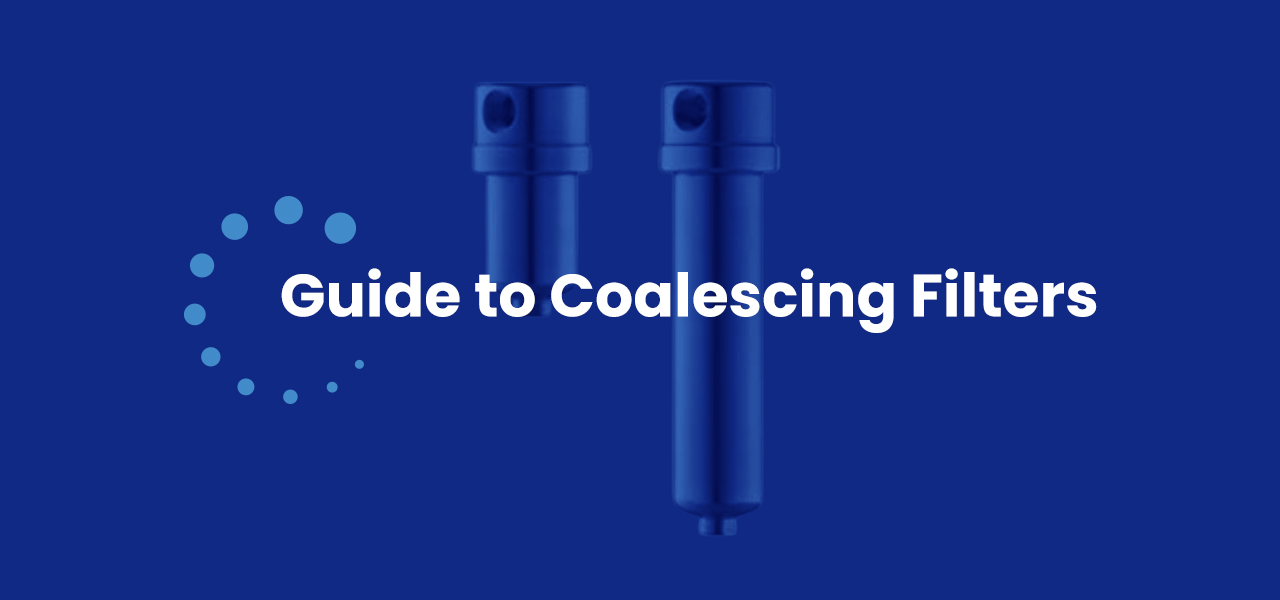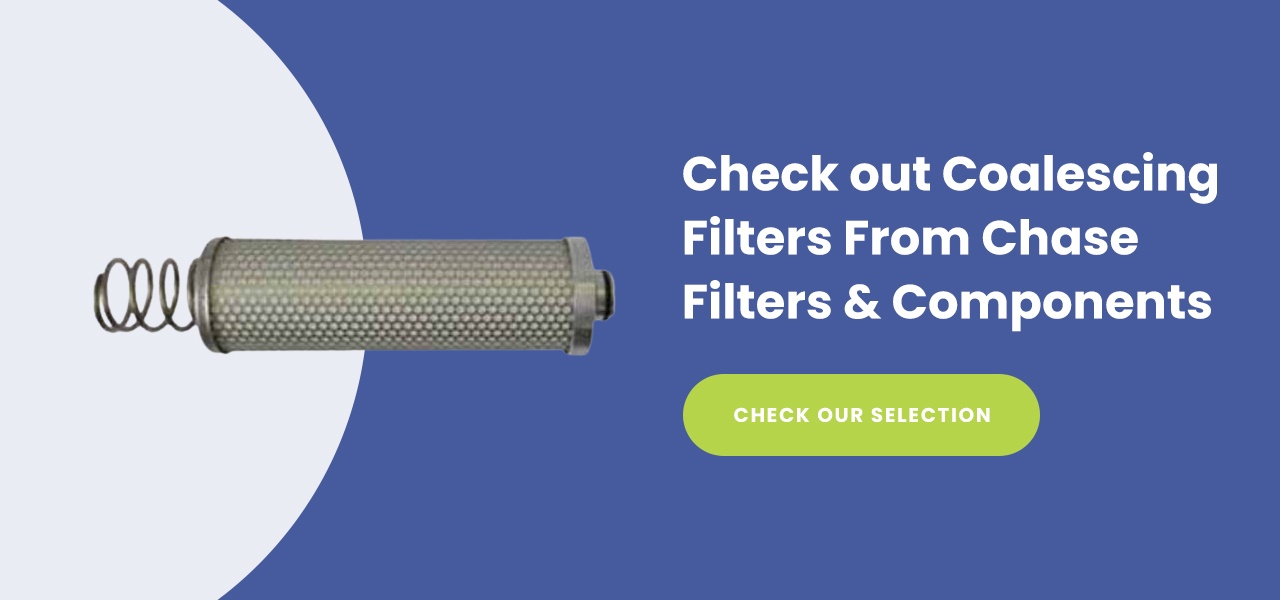February 26, 2025
Guide to Coalescing Filters

Jump To:
- What Is a Coalescing Filter?
- Functions of a Coalescing Filter
- Coalescing Filter Applications
- Benefits of Coalescing Filters
Filters are essential in many industrial applications where manufacturers and refineries need to ensure a pure, high-quality product. Contaminants like water, vapor, gases and particles can make their way into a fluid or gas, decreasing its quality and damaging the effectiveness of system equipment downstream. Coalescing filters are a crucial step in preventing contamination from liquid and vapor droplets.
Coalescing filters are crucial in various industrial and chemical applications. Manufacturers can use them for gas-oil, fuel-gas and water-gas separation. This guide to coalescing filters will explain the functions and applications of coalescing filters, so you can determine which kind fits your application.
What Is a Coalescing Filter?
A coalescing filter is a piece of equipment that filters droplets of liquid and vapors out of a substance. This filter uses a process called coalescence to separate two phases of matter from a mixture. Coalescence is the process of two or more droplets or bubbles of a substance merging into one larger droplet, which filter out easily because they are heavier. Coalescence filtration can remove matter as tiny as 0.1 microns or smaller.
Many industries use coalescing filters, though the type they use depends on their application. At some stages, coalescing filters separate contaminants in the gas phase, while others efficiently remove liquid droplets. Coalescing filters can remove water, methane, carbon dioxide, sulfur, oil and other liquid or gas impurities.
The coalescing filtration process can use two primary types of filters.
- Mechanical coalescing filters: Most industries predominantly use the mechanical coalescing filter. This filter removes impurities using a series of baffle walls or screens to trap water and vapor molecules.
- Electrostatic coalescing filters: The less common type of coalescing filter, called the electrostatic coalescer, uses electric currents to remove liquid molecules.
Implementing coalescing filters in an industrial application aims to prevent contamination of the fluid or gas that needs filtration and avoid corrosion of other system components. With a coalescing filter, manufacturers can ensure a pure end-line product and keep damaging liquid and gas impurities out of their refining equipment.
Functions and Elements of a Coalescing Filter
Precision filtration is essential in applications that rely on coalescing filters. For increased efficiency, coalescing filters feature several progressing layers of fiber, like borosilicate microfiber or semi-permeable membranes. The coalescing filter’s densely packed layers strain out aerosols and captured liquids through the filter wall.
For coalescing filters to ensure product purity, the substance that needs filtering must go through the following process.
- Fluid gets applied to the filter: The filter must have a fluid or gas stream applied to it. Usually, coalescing filters contain two or more filter points to ensure efficient contaminant removal.
- The coalescing filter separates the components: When the fluid passes through the filter, the fiber or screen separates the liquid. The filter mechanism works based on the components’ molecular weight and density. The filter traps substances like oil, water droplets and gases, while the rest of the pure fluid or gas continues through the system to the collection points.
- The impurities coalesce: The droplets left behind then coalesce into heavier particles that drain away through the filter wall by gravity. You can either dispose of or purify the remaining contaminants.
Coalescing filters work differently based on the component substance’s properties. For example, when removing oil from water, the screens redirect the heavier oil molecules to a drain point and allow the less dense water molecules to filter through. Similarly, “wet gas” — a gas containing water droplets — gets dehydrated when it passes through the coalescer, as the dense water molecules coalesce into the bottom of the tank.
Coalescing Filter Applications
Where are coalescing filters used? They fulfill multiple applications in industries that require or produce pure liquid and gas, like the oil, gas and chemical processing industries.
1. Alternative Fuel
Alternative fuel industrial filter applications include compressed natural gas, propane, electricity, methanol and more. Filters like stainless steel coalescing filters are essential for efficient operation in the following specific fluid applications:
- Aboard a CNG vehicle.
- Product Refining
- De-Humidify Natural Gas
- Purify Natural Gas
- In polyethylene terephthalate blow molding.
- At CNG fueling stations.
- When storing high-pressure air.
- To filter high-pressure compressed gas.
- Prevent Corrosion in the following:
- Compressors
- Amine/Glycol Absorbers
- Turbines
2. Chemical Processing
Filtration is crucial in chemical and polymer processing operations because the products must meet strict legal requirements. Proper quality control and filtration can ensure the product’s meet all requirements and keep operating costs low. Coalescing filters are highly effective in removing liquid and vapor contaminants from the chemicals, Air, Gas and fluids used in chemical processing. The following applications use chemical processing filters:
- Cooling and processing water used as an ingredient, coolant or washing medium.
- Manufacturing and processing liquids and pastes.
- Filtering hot gas.
3. Oil and Gas
In oil and gas energy production, downstream coalescing filters ensure the product’s purity before marketing. For example, before using crude oil for fuel or as feedstock in chemical processing, the oil refinery must separate it into various components. This process is called refining, and it involves using coalescing filters inside distillation units to de-humidify and purify the crude oil.
Alternative energy sources like natural gas must undergo processing and refining to separate the gas from liquid and aerosol contaminants. These substances include condensate, water, acid gas and mercury. Applications of oil and gas coalescing filters in downstream production include:
- Cooling water treatment.
- Fluid analysis.
- Fuel additive process.
- Gas purification.
- Process controls.
Benefits of Coalescing Filters
Numerous companies across various industries use coalescing filters in their operations. Industrial professionals use this equipment because they have experienced its many benefits, including the following.
1. Effective Filtration
Coalescing filters are highly efficient at coalescing and removing liquid and vapor contaminants. Depending on the coalescing filter design and product, they can have a 95% to 99% micron removal rate. Coalescing filters are also efficient against 0.01 microns.
At Chase Filters & Components, we guarantee 99% efficiency with our 57 Series coalescing filters because they have withstood vigorous efficiency testing. Our stainless steel and aluminum filters include C- or CS-grade elements designed to withstand temperatures of up to 900 degrees Fahrenheit and are ideal for heavy coalescing.
2. Protects Downstream Equipment
Fluid cleanliness is essential to proper system function. Contaminated fluid and gas can erode machine components and lead to deterioration. Installing coalescing filters at the appropriate locations within your industrial system can prevent these issues from occurring and protect your equipment downstream. At Chase Filters & Components, our coalescing filters are also corrosion-resistant and durable, so they can keep working for you longer.
3. Reduces Expenses
Preventing system malfunction is vital in reducing an industrial facility’s operating expenses. When system parts deteriorate quickly, they can result in overall system failure. Repairing or replacing these parts is costly, yet it could be necessary if the damage progresses. Poor system performance also leads to decreased facility efficiency. It can also increase downtime and drive up costs.
4. Custom Filters
If your application requires an unusual or outdated part, creating a custom filter with Chase Filters & Components can keep your systems running as they should. Investing in a custom filter can prevent machine wear and tear, ensure product purity and decrease maintenance costs associated with poor system performance. Chase Filters & Components can design and manufacture a custom filter to match your existing equipment.
Check out Coalescing Filters From Chase Filters & Components
Coalescing filters are essential in many industrial applications. Implementing these filters in your operations can maintain the quality of your fluids and gases, so you can ensure they are ready for the user. Coalescing filters can also benefit industrial manufacturers by helping them prolong the life of their system machinery and reduce operating costs.
Coalescing filters from Chase Filters & Components are your solution for filtering liquids and vapors in your applications. Check out our selection of coalescing filters today.
